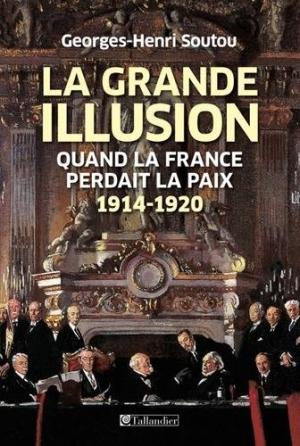This year is the Centennial of the signing of the Treaty of Versailles. Signed on 28 June 1919 in the Hall of Mirrors at Versailles Palace, the Treaty was the most important of the peace treaties that brought an end to World War I. To mark this anniversary, the Peace Palace Library has put together a collection of books exploring the background and aftermath of the Versailles Treaty. This collection will be published on the website and social media. Part II: French Aims in Paris.
What war aims did the French have during World War I and how did they negotiate the treaties that ended this war? In 1917 the Comité d'études was created by Aristide Briand to assist the French Government in formulating these aims. The work of this Comité resulted in an impressive report of around 1500 pages: maps, statistics, tracing the borders of the Alsace, the Saar Region, Lorraine, Luxembourg, Central and Eastern Europe, the Balkans, etc. At the Paris Peace Conference, the French Prime Minister, Georges Clemenceau, controlled his delegation and his chief goal was to weaken Germany militarily, strategically and economically. Having personally witnessed two German attacks on French soil in the last forty years, he was adamant that Germany should not be permitted to attack France again. In particular, Clemenceau sought an American and British guarantee of French security in the event of another German attack.
Clemenceau also expressed skepticism and frustration with Wilson's Fourteen Points: "Mr. Wilson bores me with his fourteen points", complained Clemenceau. "Why, God Almighty has only ten!" Wilson won a few points by signing a mutual defense treaty with France, but back in Washington he did not present it to the Senate for ratification and it never took effect.
Another alternative French policy was to seek a rapprochement with Germany. In May 1919 the diplomat René Massigli was sent on several secret missions to Berlin. During his visits Massigli offered on behalf of his government to revise the territorial and economic clauses of the upcoming peace treaty. Massigli spoke of the desirability of "practical, verbal discussions" between French and German officials that would lead to a "collaboration Franco-allemande". Furthermore, Massagli told the Germans that the French thought of the "Anglo-Saxon powers", namely the United States and British Empire, to be the major threat to France in the post-war world. He argued that both France and Germany had a joint interest in opposing "Anglo-Saxon domination" of the world and warned that the "deepening of opposition" between the French and the Germans "would lead to the ruin of both countries, to the advantage of the Anglo-Saxon powers".
The Germans rejected the French offers because they considered the French overtures to be a trap to trick them into accepting the Versailles treaty "as is" and because the German foreign minister, Count Ulrich von Brockdorff-Rantzau thought that the United States was more likely to reduce the severity of the peace terms than France. In the final event it proved to be Lloyd George who pushed for more favourable terms for Germany.
France, Versailles and Books
- Beau de Loménie, E., Le débat de ratification du Traité de Versailles à la Chambre des Députés et dans la presse en 1919, Paris, Editions Denoël, 1945.
- Jordan, W.M., Great Britain, France, and the German Problem 1918-1939, London etc., Oxford University Press, 1943.
- Kleine-Ahlbrandt, W.L., The Burden of Victory: France, Britain and the Enforcement of the Versailles Peace, 1919-1925, Lanham, New York, London, University Press of America, Inc., 1995.
- Lowczyk, O., La fabrique de la paix: du Comité d'études à la Conférence de la Paix, l'élaboration par la France des traités de la Première Guerre mondiale, Paris, Economica, 2010.
- McDougall, W.A., France's Rhineland Diplomacy, 1914-1924: The Last Bid for a Balance of Power in Europe, Princeton, NJ, Princeton University Press, 1978.
- Noble, G.B., Policies and Opinions at Paris, 1919: Wilsonian Diplomacy the Versailles Peace and French Public Opinion, New York, The Mamillan Company, 1935.
- Wolfers, A., Britain and France between Two Wars: Conflicting Strategies of Peace since Versailles, New York, Harcourt, Brace and Company, 1940.
Treaty of Versailles Centennial
The Treaty of Versailles was the most important of the peace treaties that brought World War I to an end. The Treaty ended the state of war between Germany and the Allied Powers. It was signed exactly five years after the assassination of Archduke Franz Ferdinand, which had directly led to the war. The other Central Powers on the German side signed separate treaties. Although the Armistice, signed on 11 November 1918, ended the actual fighting, it took six months of Allied negotiations at the Paris Peace Conference to conclude the peace treaty. The treaty was registered by the Secretariat of the League of Nations on 21 October 1919.
